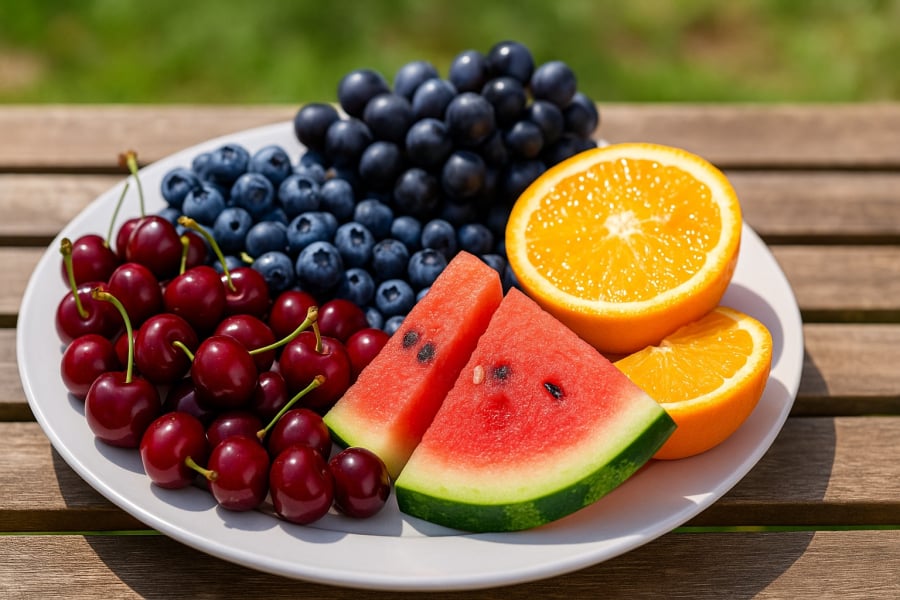Sweet Cherries: A Natural Anti-inflammatory Treat
Cherries have long been considered a “superfood” for people with arthritis. These little gems are packed with anthocyanins, powerful antioxidants that boast strong anti-inflammatory properties. A study by the University of Michigan found that participants who regularly drank cherry juice exhibited significantly lower inflammation markers than those who didn’t. According to ThS.BS Le Thi Thu Ha from Tam Anh General Hospital in Ho Chi Minh City, “Cherries are rich in anthocyanins, which help reduce inflammation and promote better sleep—a boon for rheumatoid arthritis patients who often experience nocturnal pain.”
Blueberries: Small But Mighty Anti-inflammatory Powerhouses
Blueberries are a favorite among health-conscious individuals for their delicious flavor and high nutritional content. These berries are loaded with flavonoids, compounds that neutralize free radicals, thereby reducing damage to cartilage and joints. Regular blueberry consumption also lowers the risk of cardiovascular disease, a common complication for people with rheumatoid arthritis.
Pineapple: Nature’s Anti-inflammatory Enzyme Wonder
Pineapple, a summer staple, is not only readily available but also packs a nutritional punch. Its star component is the enzyme bromelain, which has been shown to reduce inflammation and joint swelling. Enjoying fresh pineapple or sugar-free pineapple juice is not only tasty but also helps alleviate morning joint stiffness.

Oranges and Their Cousins: Boosting Cartilage Health
When it comes to summer fruits, we can’t forget the citrus family. Oranges, tangerines, and grapefruits are rich in vitamin C, which stimulates collagen production in the body. Collagen is a crucial component of cartilage. Additionally, vitamin C helps slow down chronic inflammation. Start your day with a glass of fresh orange juice or add some grapefruit segments to your green salad for a joint-friendly treat.
Watermelon: Cooling and Anti-inflammatory
On sweltering summer days, there’s nothing like a slice of watermelon to refresh the spirit. Watermelon not only hydrates but also delivers a healthy dose of lycopene, an antioxidant that reduces joint inflammation. A study published by the Arthritis Foundation revealed that a lycopene-rich diet lowers the risk of chronic inflammation and joint damage.
Papaya: Digestive Aid and Anti-inflammatory Fruit
Ripe papaya is an excellent source of vitamin C and the enzyme papain, which aids digestion and reduces inflammation. For people with rheumatoid arthritis, eating papaya not only improves digestive health but also lessens the burden on the joints by enhancing nutrient absorption. Enjoy papaya fresh, in smoothies, or mixed with plain yogurt for a tasty treat.

Apples: The Ideal On-the-go Snack for Arthritis Sufferers
Apples are rich in quercetin, a potent flavonoid that reduces inflammation and safeguards joint cartilage. Plus, apples are convenient and portable, making them a healthy snack option. For maximum nutritional benefit, eat the apple with its skin after washing it thoroughly.
Grapes: Nature’s Resveratrol Source
Resveratrol, found abundantly in red grapes, is renowned for its anti-inflammatory and cardiovascular benefits. For individuals with rheumatoid arthritis, including grapes in their diet can help alleviate joint inflammation and pain. Opt for fresh grapes and avoid dried grape products that often contain added sugars.
Mangoes: Naturally Sweet and Vitamin-rich
Ripe mangoes are packed with vitamin C, beta-carotene, and antioxidants, all of which boost bone and joint health while strengthening the immune system. However, due to their natural sweetness, individuals with rheumatoid arthritis who also have diabetes or are overweight should enjoy mangoes in moderation.
Some Tips for Enjoying Fruit if You Have Rheumatoid Arthritis
- Prioritize fresh fruit and avoid processed or sugar-added options.
- Combine fruit with a balanced diet that includes plenty of green vegetables, lean protein, and whole grains to optimize joint health.
- For sweeter fruits like mangoes, grapes, and watermelon, practice portion control if you’re concerned about blood sugar fluctuations.
- Always consult your doctor or a registered dietitian before making significant changes to your diet.






























